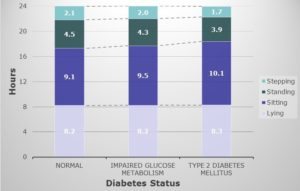Assessing physical activity
Quantifying physical activity, or lack thereof, have been used to analyse sedentary behaviour in order to understand physical activity and disease outcomes, as well as define the effectiveness of intervention strategies. Physical activity has previously been assessed by means of self-reported measures such as questionnaires and interviews, especially in larger population studies. However, such self-reported measures can report bias in the study. With advancement in technology, wearable activity monitors are increasingly being used to objectively quantify free-living sedentary behaviour. Furthermore, they are generally small, lightweight, portable, non-invasive and unobtrusive.
The study
A recent large population study (2,497 individuals) published in the journal Diabetologia on 2 February 2016 (1) was one of such studies undertaken to measure free-living sedentary behaviour using wearable activity monitors. The study, led by first author Julianne van der Berg and senior author Annemarie Koster from Maastricht University, looked at the amount and patterns of sedentary (sitting or reclining) behaviour in relation to type 2 diabetes and the metabolic syndrome. It was performed within The Maastricht Study, an extensive phenotyping study of adults that focuses on the etiology of type 2 diabetes and its complications and comorbidities.
Results
The study participants with Type 2 Diabetes spent less time stepping and had less moderate intensity activity but the most significant risk factor is the increased time spent sedentary (sitting/lying). It was concluded that an extra hour of sedentary time was associated with a 22% increased risk for type 2 diabetes and 39% increased risk for the metabolic syndrome. These results suggested that sedentary behaviour may play a significant role in the development and prevention of type 2 diabetes.

Fig. 1 Time (hours) spent in primary daily activities according to glucose metabolism status. (Adapted from van der Berg et al., 2016) (1)
Activity monitors
There are activity monitors that have been developed for research purposes and more specifically, for accurately distinguishing sedentary behavior. The Glasgow-based PAL Technologies’ activPAL™ activity monitor was chosen by the researchers in the Maastricht Study. Similarly, the MOX activity monitor has proven high accuracy in determining free-living physical activity behavior and assessing different activity intensities in healthy and chronically ill patients (chronic obstructive pulmonary disease, type 2 diabetes or mitochondrial disease) (2, 3). Furthermore, the MOX activity monitor is waterproof and can be adhered directly to the skin on the thigh 24/7 for 8 days by a patch. Using accurate, reliable and objective activity monitors is an advantage as advances in accelerometry technology have allowed low power consumption, easy setup, and unobtrusive design to provide a promising tool for monitoring free-living physical activities.
Click here to the article by van der Berg et al. published online in the journal Diabetologia, 2016.
REFERENCES
- van der Berg JD, Stehouwer CDA, Bosma H, van der Velde JHPM, Willems PJB, Savelberg HHCM, et al. Associations of total amount and patterns of sedentary behaviour with type 2 diabetes and the metabolic syndrome: The Maastricht Study. Diabetologia. 2016;59(4):709-18.
- van der Weegen S, Essers H, Spreeuwenberg M, Verwey R, Tange H, de Witte L, et al. Concurrent Validity of the MOX Activity Monitor Compared to the ActiGraph GT3X. Telemedicine and e-Health. 2015;21(4):259-66.
- Koene S, Dirks I, van Mierlo E, de Vries PR, Janssen AJWM, Smeitink JAM, et al. Domains of Daily Physical Activity in Children with Mitochondrial Disease: A 3D Accelerometry Approach. Berlin, Heidelberg: Springer Berlin Heidelberg. p. 1-11.
For more information about The Maastricht Study:
https://www.demaastrichtstudie.nl/research
For further information about the Maastricht Study, please contact :
 Anniemarie Koster
Anniemarie Koster
Associate Professor
Associate Professor Programme: Inequity, Participation and Globalisation (IPG)
Sociale Geneeskunde, School for Public Health and Prim Care, Fac. Health, Medicine and Life Sciences